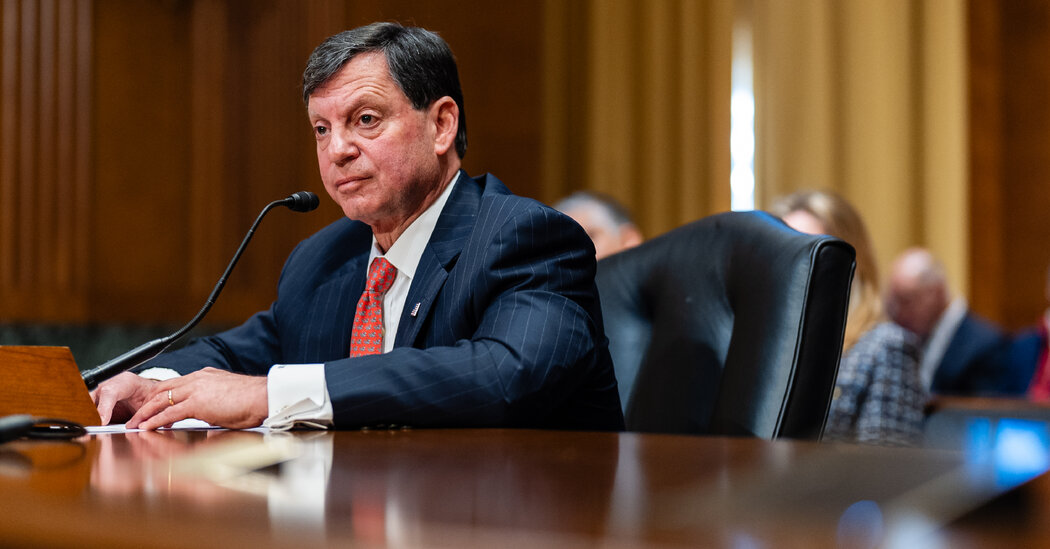In the stock market, timing is everything.
Frank Bisignano, the former chief executive of the global payments and financial-technology company Fiserv, was forced to sell his stake in the company to join the Trump administration as head of the Social Security Administration.
He did so over several months this year. Between May and August, Mr. Bisignano and his family netted roughly $560 million from their stake in the company, according to securities filings. In doing so, they avoided a dizzying decline in the company’s stock price that started this week after Mr. Bisignano’s successor, Michael Lyons, warned of a steep drop in the company’s growth trajectory and its profits. Mr. Bisignano and his family’s holdings would have been valued at around $215 million at Thursday’s close.
Fiserv stunned Wall Street on Wednesday, saying its previous forecasts were too optimistic. Its stock price has dropped nearly 50 percent since the end of trading on Tuesday, erasing nearly $35 billion of its market valuation. Mr. Lyons delivered a damning indictment of the company’s decisions under Mr. Bisignano.
“Over the last few years, decisions to defer certain investments and cut certain costs improve margins in the short term, but are now limiting our ability to serve clients in a world-class way, execute product launches to our standards and grow revenue to our full potential,” Mr. Lyons told investors on Wednesday.
Mr. Lyons said he spent his first months in the job, which he assumed after Mr. Bisignano became the commissioner of the Social Security Administration in May, studying Fiserv’s finances and business.
“And as I got a more fulsome understanding of those, that obviously prompted some dissatisfaction with the way we do the process,” Mr. Lyons said. He made a slew of changes to the executive team, including hiring a new chief financial officer and two new co-presidents.
He also added three new board members from Bridgewater, BlackRock and RBC. Of the new additions, one is a new independent board chairman and two of the new directors will join the audit committee. He also brought in the consulting firm McKinsey to advise them.
Mr. Bisignano began selling his Fiserv stock once he was confirmed by the Senate in May. The company’s stock has struggled this year, and Mr. Bisignano began selling after the share price hit its peak in March. In September, Mr. Bisignano filed paperwork with the government saying he had fully divested his holdings.
Mr. Bisignano was also tapped this month to simultaneously serve as the chief executive of the Internal Revenue Service, a new role that the Trump administration created after other I.R.S. leaders were fired or quit. Treasury Secretary Scott Bessent, who is also the acting I.R.S. commissioner, praised Mr. Bisignano at the time as “a businessman with an exceptional track record of driving growth and efficiency.”
A class-action lawsuit filed this summer accuses Mr. Bisignano and Fiserv of misleading investors with inflated growth numbers. Fiserv has said it plans to “vigorously” defend itself in the case. The I.R.S. and Social Security Administration did not respond to requests for comment. Mr. Bisignano did not respond to a request for comment.
In his final earnings call as chief executive, Mr. Bisignano took a victory lap of sorts, talking about how radically the business had changed over the past five to seven years: “We built this. We executed,” he told analysts in April. “We got through the consolidation, but we’re still optimizing the construction of the company and adding more capability.”
During Wednesday’s investor call, Mr. Lyons, who was president of PNC Financial Services before joining Fiserv this year, painted a picture of a business that was run to maximize profits over the short term. He specifically referred to many of his predecessor’s decisions that, if continued, would have put the business on a perilous trajectory.
“While there are certainly some areas where we are dissatisfied with our recent performance, we found that our challenges are largely driven by our own doing,” he said. “Nothing at Fiserv is fundamentally broken.”
Andrew Duehren covers tax policy for The Times from Washington.
Maureen Farrell writes about Wall Street for The Times, focusing on private equity, hedge funds and billionaires and how they influence the world of investing.
The post A Top Trump Official Had to Sell His Stock. He May Have Saved Millions. appeared first on New York Times.




